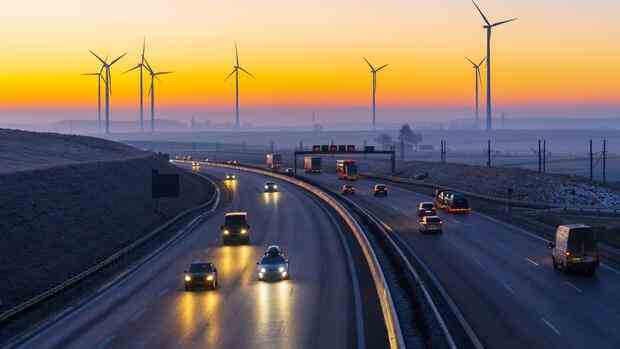The Greens want to expand rail transport, but not road traffic.
(Photo: imago images/imagebroker)
Berlin When the coalition committee meets on Thursday afternoon, Chancellor Olaf Scholz (SPD) will primarily have to arbitrate between the FDP and the Greens. For months, the coalition partners have been arguing about issues such as approval procedures, data retention, collective action guidelines or biofuel and efficiency requirements for companies.
At least after the decision to deliver the Leopard battle tank to Ukraine, there is hope that a new sense of community will develop again.
However, there is disagreement about what the Progress Coalition calls progress. The most important topic is likely to be the ongoing dispute about speeding up the approval process. In the Bundestag, Scholz announced on Wednesday that there would be a solution “soon”.
After the Greens expected a lot from their clientele in the first year in view of the crises, they want to send clear signals: They want to use scarce resources for their projects, such as reserving hydrogen for industry, not for transport; use synthetic fuels only for airplanes and shipping, not for cars and trucks; Use planners and engineers to expand power grids or rail transport, which they see as climate-friendly – but definitely not for new roads.
Top jobs of the day
Find the best jobs now and
be notified by email.
The Greens want to push through the construction freeze for roads in the debate about faster planning and approval processes. Chancellor Scholz has promised to halve the process times. But the coalition has been arguing about the way for a year. Three meetings in the Chancellery with Ministers Volker Wissing (FDP) and Steffi Lemke (Greens) did not help.
The focus is on Wissing’s draft law, which declares an “overriding public interest” for all infrastructure projects and thus overrides environmental and nature conservation regulations and significantly shortens court proceedings. For him, infrastructure is fundamental to growth. Lemke, meanwhile, refers to the protection of livelihoods enshrined in the Basic Law.
compromise in sight
The Greens reject the FDP proposal and are supported by environmental groups. The BUND, for example, described Wissing’s proposal to define new motorway construction and expansion as an overriding public interest as “another major attack on climate protection”.
A compromise is emerging. Minister Wissing seems ready to concentrate on the bottlenecks in the motorway network. He identified 144.
The Greens would also help to close one or the other gap. “Closing the gap certainly makes sense,” admitted the Parliamentary State Secretary in the Ministry of the Environment, Christian Kühn (Greens). “In terms of climate policy, I would say that a turbo doesn’t make sense when building a new motorway.” The FDP sees it differently.
In addition, the Greens are willing to rehabilitate the many dilapidated bridges in the country with shortened approval procedures and, if necessary, even to widen them by two lanes in view of the increasing traffic. The SPD also supports this. The federal government has identified 4,000 bridges that will need to be renovated over the next ten years. However, progress is difficult.
“It’s time for the traffic light government to accelerate planning in the transport sector and for the FDP and Greens to finally stop fighting each other,” said the deputy chairman of the Union faction, Ulrich Lange (CSU). “The federal trunk roads must benefit from faster planning processes.”
More: German ports are to become Europe’s leading energy and raw material hubs
